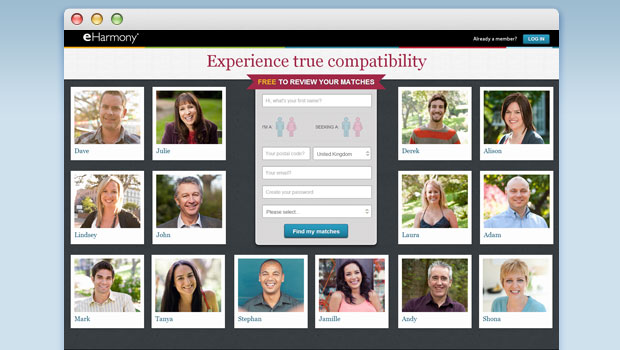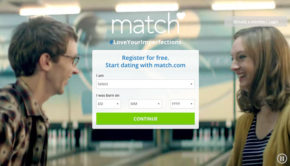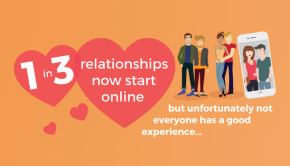Love in the time of algorithms
Why are dating sites using these systems?
Does it somehow make online dating and finding a suitable partner easier for members? Well, here the verdict is still out as there are those who firmly believe it helps to group people and select suitable matches from those that don’t quite fit the picture.
And then there are those who consider it a pseudo-scientific mumbo-jumbo only added to sites to make matching seemingly more trustworthy and to lure in clients with promises of finding them a truly compatible match.
We think the right answer’s probably somewhere in the middle.
Matters of the heart
Common sense tells us that when the question is about love, chemistry and attraction no test can tell us what our heart wants or who we are drawn to.
As someone once very cleverly put: “The heart wants what it wants. And so do the loins…” Yet many dating sites have put in years and years of work and research developing their compatibility testing systems which we believe carry some value.
Whether it’s enough to base your decisions solely on the test results and discard those not seemingly suitable – we very much doubt it. We would advise you use them as a helping tool, not as something you lean on entirely. Plus, it can be kind of entertaining – so even if you don’t believe in that kind of thing, you can still have some fun.
The compatibility and matching features on dating sites generally fall into three categories. We are going to take a look at these practices, lay out the good and bad sides of each approach and give you some advice how to get the best results with said testing systems.
Matching according to profiles

Some sites – the ‘king of dating sites’, Match.com amongst them – don’t require their members to fill out any kind of specific questionnaire in addition to the usual profile questions.
Instead, what they do is try and match you according to the answers you’ve given in your profile. You mark down your preferences and what you look for in a partner anyway – so in a way it makes sense that there’s no need for the extra compatibility test. Especially as the scientific approach doesn’t necessarily guarantee you any better results than matching according to the answers you’ve given in your profile.
At the same time, it also seems a little random. People tend to trust numbers and figures when they’re confronted with them. If a site matches you with another member according to the answers you’ve both given during your profile-building and then gives a percentage of the suitability, then a lot of people go by that even though it doesn’t necessarily prove anything.
Some people just don’t take creating their profile that seriously, so making any kind of educated decisions based on that is just not very viable.
So what can you do to get good results on sites that use this type of compatibility system? Well, first and foremost, you can make sure that you take profile creation as seriously as possible.
Remember, this will be the gateway to lead potential partners your way, so you have to be thorough, honest and straightforward in your answers.
Don’t leave any boxes empty, put down as many likes and dislikes as possible, focus on your description of the partner you’re looking for.
The better the profile, the more chances will you have to get a wide selection of matches that will also be compatible with what you’re looking for.
When searching, bear in mind that not everyone puts in the same kind of effort and therefore don’t pay too much attention to the system’s compatibility score. Instead, look for specific features in their profiles that truly matter to you and then make up your own mind about whether you see yourself dating that person or not.
Dating sites that use this system are Match.com, Guardian Soulmates and AYI Dating, all with varying degrees of success. Match, for example, has worked very hard on making their matching system as trustworthy as possible.
Whatever questions you answer about the date you’re looking to find, you can also determine how important said criteria are for you in a match: whether it’s a “must have” or something you’re willing to compromise on.
However, Match goes further than just that, taking into consideration the fact that people might put something down in their profile as an absolute ‘must’ but in fact still lean towards compromising.
Match has an algorithm that can pick up on that dissonance according to your online behaviour and therefore you might sometimes get match suggestions outside “your box”.
And even that’s not all Match does in order to find you a truly compatible date. Apparently they also monitor users who behave like you on the site and give you suggestions based upon that too. In a way they’re trying to stay one step ahead of you and do some guesswork as to what you might want before you’ve even managed to put it in words. Because sometimes we don’t know what we really want but the algorithm can pick it up, based on our online behaviour – much the same way Google works. Match tries to put their finger on that subtle pattern that we and other members like us weave online, and point us in the direction.
Of course, not all sites are as extensive and successful with that work. Some of them literally only look at your likes and dislikes and then match it with those of other members.
Coldplay lovers are matched with Other Coldplay lovers, Sex and the City fans get good compatibility scores with fellow S&TC aficionados. Simple as that but definitely not very insightful.
Matching according to a questionnaire

There are sites that don’t consider it necessary to take the scientific approach when trying to match their members but who think that profiles alone won’t suffice either.
The most famous example is, of course, OK Cupid, the free site where users can answer hundreds of questions, which the system then uses as their matchmaking tool.
The idea behind it is simple enough to seem logical – the more subjects and viewpoints people agree upon, the more likely are they to hit it off in the real world.
After all, we do know that similar values DO matter in relationships and that there are certain opinions of ours we shouldn’t compromise on. So this option gives you the best insight to what people actually think.
At least it does in theory.
Remember, not everyone takes those questionnaires very seriously. Some members are just there to get a date, pronto – and they don’t give a damn about if they prefer kiwis to bananas or democrats to republicans.
Also, I suppose another critique about this style of system would be the time factor.
In order for that kind of compatibility test to work, you would have to answer a lot of questions – and in most sites like that, there are hundreds and hundreds of questions, so it would take you a fair bit of time to give replies to all of them.
After a while you almost do it automatically, without giving much thought to it, as your mind gets tired. You’re on a dating site for finding a date, not for answering loads of random questions.
So how to make this experience as useful and efficient as possible? None of those questionnaires require you to answer every single question.
I’d say, focus on those that really matter to you and try and give a meaningful answer to as many as you can. You don’t have to do it all in one go, you can just come back the next day and carry on from where you left off. Remember, the trick that makes these things work, is the quantity – the more questions you answer, the more accurate the result.
But there’s no need to ponder about things that hold absolutely no significance to you – if you don’t really care whether the next holiday is a beach vacation or a city trip, don’t waste your time on it.
Make sure you nail these questions that really matter to you: whether you want to have kids, whether you would ever date a smoker, whether you like exercising – whatever it is for you that you consider important in your partner.
Dating sites that use this practice are OK Cupid, Friends Reunited Dating, J-Date and Love&Friends.
Out of those we would really applaud OK Cupid’s system – not just because it’s so extensive, but also because we can see how much thought has gone into it, in order to make it work best for their customers. At that, let us remind you, that OK Cupid is a free site.
There are many different subjects covered by these questions, ranging from personal hygiene to political views, there are those assessing your intellectual ability, your hobbies, your plans for the future and even your abstract thinking.
Also, there’s an option for you to mark, how you would like your ideal match to answer and you can even indicate how important that particular question is for you.
You won’t just have to count on OK Cupid’s matching – when browsing at the members, you can take a look at all the questions they have answered and how they have answered.
Matching according to the scientific approach

Finally, there’s the mother of all compatibility systems – the scientific approach. Most sites that tend to use them, also take great pride in them and the way they have been developed over the years.
Some sites, like eHarmony and Affiny are also more expensive than some other online dating sites, and partly that probably attributes to the scientific tests as well, because as we all know, science doesn’t come cheap. Nor should it.
Why is the scientific approach superior to others?
Well, the easy answer would be: because a lot of hours and manpower has gone into developing the best algorithms and the cleverest ways to calculate the compatibility factor.
A lot of effort and hard work has gone into the process. Psychology is not as straightforward a science as let’s say, mathematics or physics, but it’s nevertheless all about hypothesis, empirical data and trying to work out the best solution.
And not just that – these tests are insightful, deep and interesting to take – even without the added bonus of being designed for matchmaking purposes.
You might find out some very interesting stuff about yourself (for example, take a look at our Explorer, Director, Negotiator, Builder article) that gives you a better idea of who you are and what you’re looking in life.
The downside to all of this is the fact that people tend to place very much trust in something with a “scientific” label attached to it.
Aren’t scientists ever wrong?
Even Albert Einstein was wrong when he argued that universe is an unchanging constant, static and closed as opposed to expanding.
Scientists too learn every day and human psyche is probably one of those subjects where they still have a long way to go. Therefore we can acknowledge that while a lot of work has gone into these tests, it won’t actually give you any kind of guarantee.
The scientific approach often takes into account not just your conscious and calculated responses but also tries to coax out relevant answers from your subconscious – with abstract questions and fine-tuned psychology – the advice to reply as honestly as possible doesn’t really apply here.
I suppose you could just try and open your mind to it as much as you can and place your trust in the system – at least while answering.
Later on, when browsing through profiles you’d do well, of course, to remember that no amount of testing and psychology and science can really show you who would be your perfect match. It can aid you in that process but don’t rely upon it.
The sites using this approach are eHarmony, Plenty of Fish, Parship, Be2 and Affiny.
eHarmony’s test is probably one of the most famous, as it’s not only an extremely extensive personality questionnaire but it’s also very well designed and fun and easy to use.
Like they say in their ads, it covers 29 dimensions of your life and personality – there are hundreds of questions and it will take a lot of time to answer them.
There’s really no other way around it though because eHarmony’s whole concept is focused on matching you according to your answers.
Plenty Of Fish is a free dating site with a very comprehensive testing system in place, which they take pride in, saying that 17% of the time they can pick the person for you that you will end up dating – their test tries to calculate on the basis of emotional needs as well as relationship needs.
Dating compatibility: Conclusion
So, as a conclusion, what can we say: does compatibility testing work or should we leave it down to hard work on a dating site searching for a match, fate, chemistry, coincidence…?
I suppose the jury is still out and there is no verdict yet.
In any case, compatibility testing is always going to be just one extra feature in a dating site.
When it comes to relationships nobody should just jump in with their eyes closed just because a machine or a system figured this would be the right thing to do.
Love just doesn’t work like that – if it did, someone who came up with a perfect compatibility test would become very-very rich.
Personality tests will just aid us on our way.
This doesn’t mean we shouldn’t ask for the best systems – and it’s up to you to decide what works for you.




















